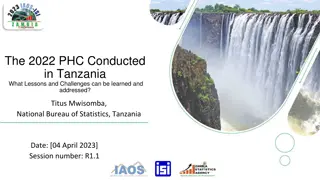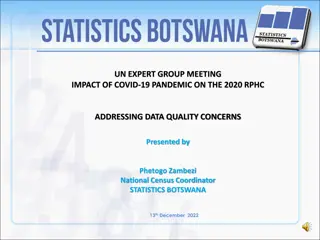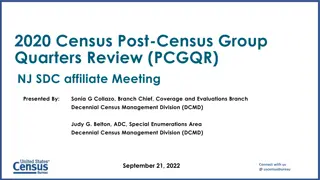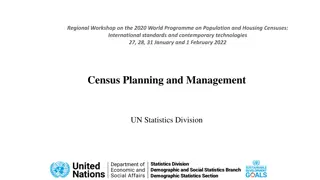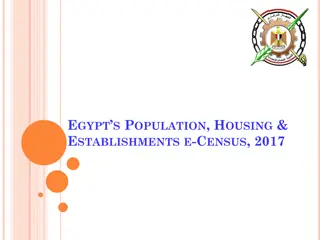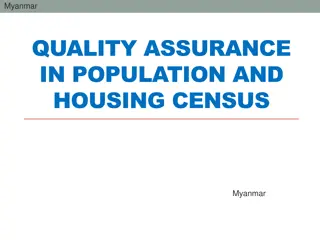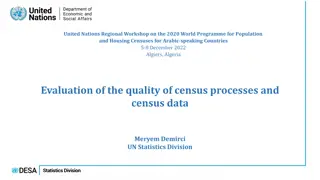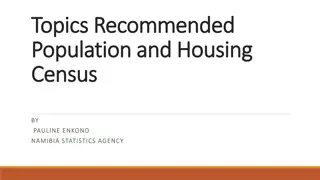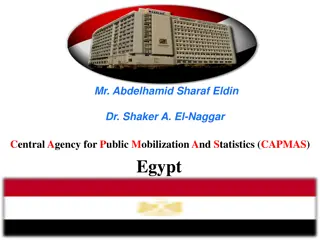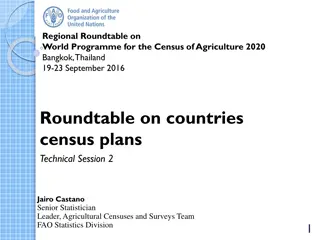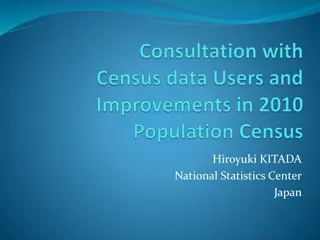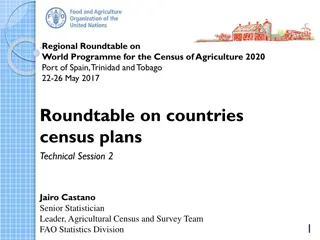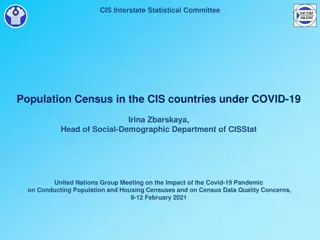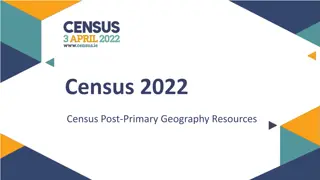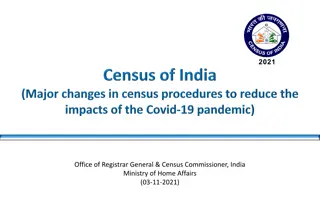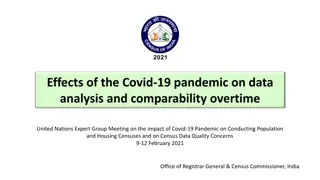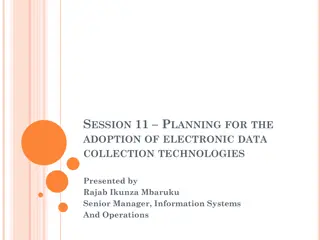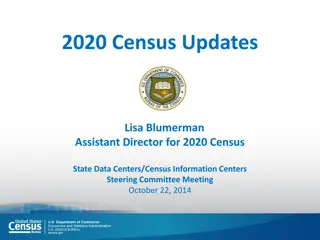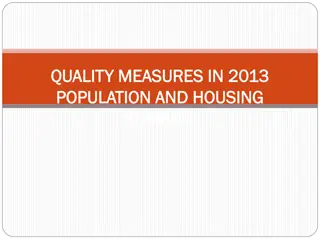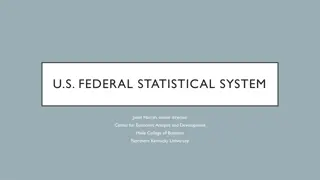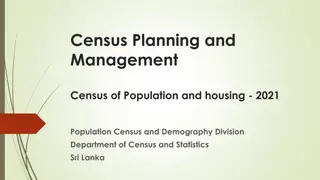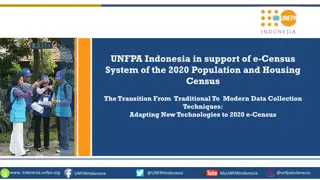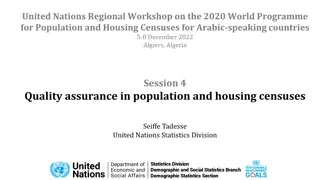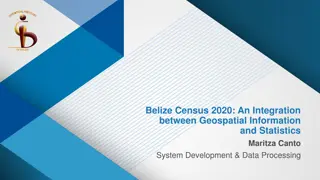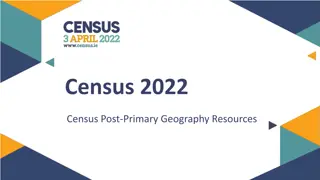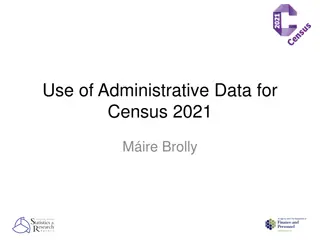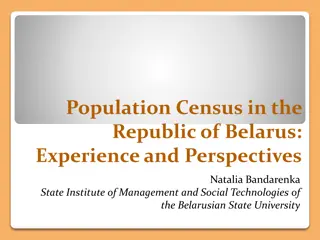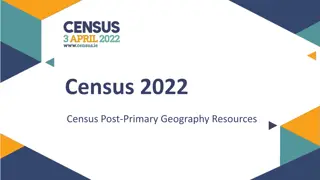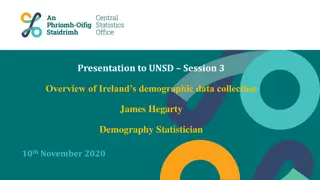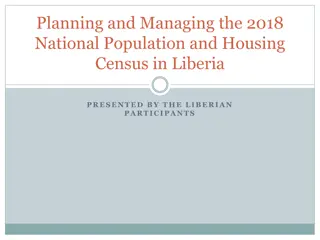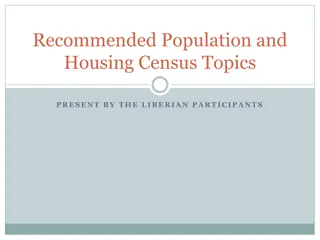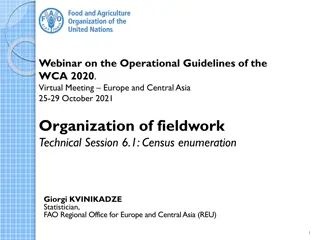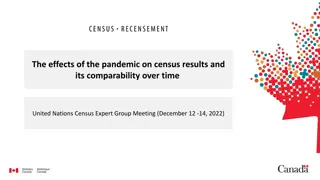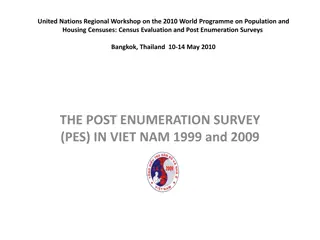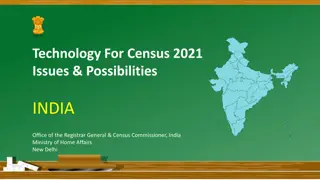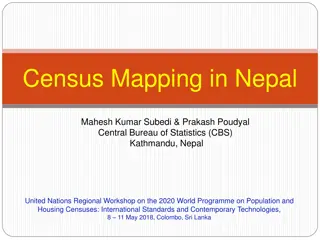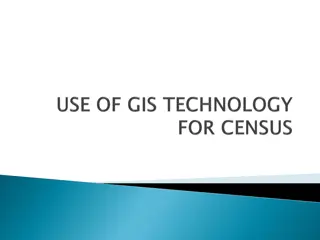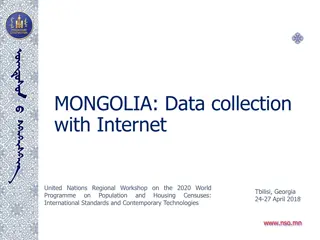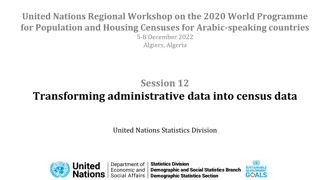Insights from the 2022 Population and Housing Census in Tanzania
Tanzania conducted its 6th post-independence census in 2022, incorporating a parallel Housing Census for the first time. Lessons learned include data collection improvements and addressing challenges such as data demand gaps. The census covered diverse topics like demographics, disabilities, migrati
1 views • 18 slides
Impact of COVID-19 Pandemic on Botswana's 2022 Population and Housing Census: Addressing Data Quality Concerns
Explore the challenges faced by Botswana's National Census Coordinator in conducting the 2022 Population and Housing Census amid the COVID-19 pandemic. Issues such as changes in census dates, review of instruments, cartographic exercises, procurement, training, enumeration, and data processing were
1 views • 20 slides
Overview of 2020 Census Post-Census Group Quarters Review
The 2020 Post-Census Group Quarters Review (PCGQR) is a program developed by the Census Bureau to address discrepancies in group quarters population counts from the 2020 Census. This initiative allows governmental units in the US and Puerto Rico to request a review of their group quarters' populatio
0 views • 12 slides
Effective Census Planning for Successful Population and Housing Censuses
Census planning is crucial for the success of population and housing censuses, involving phases like questionnaire design, mapping, testing, enumeration, and data analysis. The link between these phases plays a vital role in the overall success of the census operation. The aim of census planning is
0 views • 24 slides
Overview of Egypt's 2017 Population, Housing & Establishments E-Census
The Egypt 2017 E-Census aimed for full population coverage, data quality, stakeholder involvement, confidentiality, cost-effectiveness, and integration with other databases. It focused on place of enumeration, data collection methodologies, and e-census concepts/components for timely and accurate da
0 views • 19 slides
Myanmar Population and Housing Census Quality Assurance
Myanmar conducts a census every 10 years to gather accurate and reliable data for decision-making. The process includes planning, management, field operations, data processing, analysis, and dissemination. Various activities such as consultation, training, and monitoring are carried out to ensure th
0 views • 24 slides
Importance of Census Evaluation in Ensuring Data Quality
A population and housing census involves various complex steps where errors can occur. Evaluating the census is crucial to assess the effectiveness of operations and systems, identify strengths and weaknesses, and improve data quality for future censuses. By establishing a comprehensive evaluation p
0 views • 28 slides
Population and Housing Census Topics to Cover in Namibia
The Namibia Statistics Agency is preparing for the 2020 census with a focus on gathering data on population distribution, demographic characteristics, migration patterns, education levels, and labor force details. The selection of topics is driven by the country's data needs, ensuring comprehensive
0 views • 13 slides
Egypt 2017 Census: Strategic Objectives and Goals
The Egypt 2017 Population, Housing, and Establishment Census focused on strategic objectives such as full population coverage, confidentiality of data, and adherence to quality standards. The goals included involving stakeholders, achieving compliance within budget and timetable, and ensuring a well
0 views • 54 slides
Overview of Agricultural Census Participation in Asian Countries
This text highlights the participation of Asian countries in agricultural censuses during the World Programme for the Census of Agriculture (WCA) rounds in 2010 and planned for 2020. It provides insights into the countries that conducted agricultural censuses, their respective plans for the upcoming
0 views • 14 slides
Innovations in 2010 Population Census: Enhancing Data Dissemination
The 2010 Population Census in Japan saw significant advancements in data collection, tabulation, and dissemination methods. Innovations included introducing multiple options for questionnaire submission, leveraging ICT for dissemination, and improving tables to reflect societal changes. Consultation
0 views • 13 slides
Regional Roundtable on World Programme for the Census of Agriculture 2020
The Regional Roundtable held in Port of Spain, Trinidad and Tobago in May 2017 focused on countries' census plans for the World Programme for the Census of Agriculture. The event discussed participation statistics, census rounds, and the status of FAO Caribbean countries in conducting agricultural c
0 views • 13 slides
Population Census Methods and Quality Control in the CIS Region under COVID-19
The Population Census in the CIS countries faced challenges due to COVID-19, leading to a shift in census methods from traditional face-to-face interviews to online and multiple technical means. Quality control measures were implemented to avoid double counting, ensuring complete population registra
0 views • 10 slides
Importance of Census Information for Local Planning and Decision Making
Understanding the types of information collected through the census and how it can be utilized by organizations to make informed decisions for the local area. Explore the potential impacts of lacking census data on transportation, housing, cultural events, and healthcare services over the next few y
0 views • 6 slides
Census Activities and Methodologies in India
The Office of Registrar General & Census Commissioner in India provides an overview of the Census activities, timelines, and methodologies employed for data collection, management, and dissemination. The process includes phases for houselisting, population enumeration, and updating of jurisdictional
0 views • 18 slides
Impact of Covid-19 on Census Data Analysis: Insights from the UN Expert Group Meeting
The Covid-19 pandemic has significantly affected data analysis and comparability over time, particularly in the context of population and housing censuses. This impact was discussed at the United Nations Expert Group Meeting in February 2021, focusing on the challenges faced in conducting these cens
0 views • 16 slides
Modernizing Census Operations with Electronic Data Collection Technologies
Recent technological advancements have revolutionized census processes, enhancing the efficiency and accuracy of data collection. This session delves into the strategic considerations for adopting electronic devices and mobile data capture in census operations. Insights from past experiences in Keny
0 views • 18 slides
Efforts to Optimize the 2020 Census Operations
The 2020 Census is focusing on operational research and development to enhance self-response rates, reengineer address canvassing, and utilize administrative records. By maximizing self-response through various channels such as internet options and social media advertising, the Census aims to reduce
0 views • 20 slides
Population and Housing Census Process in The Gambia
In The Gambia, the Population and Housing Census is conducted in April during the dry season for accessibility. A detailed mapping process was undertaken using modern technology to prepare for the census. Census instruments were carefully designed, and a pilot census in 2012 helped refine the proces
0 views • 10 slides
Overview of the U.S. Federal Statistical System and Census Geography
The U.S. Federal Statistical System comprises 13 principal statistical agencies responsible for collecting and analyzing data across various sectors. The system includes agencies like the Bureau of Economic Analysis, Bureau of Labor Statistics, and U.S. Census Bureau. Geographic identifiers (GEOIDs
0 views • 94 slides
Overview of Census Planning and Management in Sri Lanka
The Census of Population and Housing in Sri Lanka has a rich history dating back to 1871, making it the first Population Census in South Asia. The census is conducted every 10 years, except in the 90s, to provide valuable demographic data. Various gazette notifications, including the Census Ordinanc
0 views • 12 slides
Transitioning to Modern Data Collection Techniques in the 2020 Population and Housing Census
UNFPA Indonesia is supporting the transition to a modern e-Census system for the 2020 Population and Housing Census. This shift involves adapting new technologies, such as e-Census, to replace traditional data collection methods. The challenges faced include a need for quality field officers, time c
0 views • 10 slides
Importance of Quality Assurance Programmes in Population Censuses
Quality assurance programmes play a crucial role in ensuring the accuracy and reliability of census data. These programmes help in identifying and rectifying errors at various stages of the census process, ultimately leading to high-quality outcomes that are valuable for data users. Emphasizing on t
0 views • 26 slides
Evolution of Census Mapping in Belize
Integration of geospatial information and statistics in the Belize Census of 2020 marked a significant advancement from the methodology used in the 2010 census. The Statistical Institute of Belize (SIB) plays a crucial role in collecting, compiling, analyzing, and disseminating census data. Census m
0 views • 18 slides
Unpacking the Historical Relationship Between the US Census and Race
Dr. Karen Gaffney from Raritan Valley Community College delves into the complex historical ties between the US Census and race, exploring how categorization influenced social hierarchies and citizenship. She questions past practices, offering insights into future census considerations. The session h
0 views • 23 slides
Encouraging School Community Participation in Census 2022
Explore the significance of engaging various groups within a school community in Census 2022. Understand what matters to different community members and learn strategies to encourage their active participation in the census for better representation of diverse needs. Discover how census data can sup
0 views • 12 slides
Utilizing Administrative Data for Census 2021: Insights and Strategies
Providing a comprehensive overview of the historical use of administrative data for census purposes, this content delves into methodologies adopted in previous censuses, such as hand-delivery, online attempts, and administrative data enrichment. It also outlines plans for the 2021 census, focusing o
0 views • 19 slides
Population Census in the Republic of Belarus: History, Principles, and Significance
The Population Census in the Republic of Belarus has a rich history, with nine previous counts conducted since 1897. This census provides essential demographic data, including information on sex, age, nationality, education, marital status, and more. The census program in Belarus is based on fundame
0 views • 26 slides
Understanding the Importance of Census Data in Society
Delve into the significance of census data through a series of engaging images and prompts. Learn how census information impacts decision-making in areas such as healthcare, education, transportation, and more. Explore the history of census-taking in Ireland and reflect on how census data can influe
0 views • 12 slides
Overview of Ireland's Demographic Data Collection
Ireland conducts a Census of Population every 5 years, with the most recent in 2016. Inter-Census Population Estimates are obtained annually using demographic methods. For the 2020 European Census cycle, Ireland is holding a traditional Census in 2022 due to COVID-19 impacts. A pilot administrative
0 views • 8 slides
Planning and Managing the 2018 National Population and Housing Census in Liberia
Liberia conducted its 2018 Population and Housing Census to provide relevant data for development planning, policy formulation, and service delivery. The census, mandated by Article 39 of the Constitution, aimed to improve citizens' quality of life and support development programs. The project invol
0 views • 14 slides
Overview of Recommended Population and Housing Census Topics in Liberia
The Liberian participants have presented recommended topics for the population and housing census, outlining the history of census-taking in Liberia and detailing the specific topics covered in the 2008 National Population and Housing Census. The census topics include identification particulars, pop
0 views • 11 slides
Operational Guidelines for WCA 2020 Census Enumeration Webinar
This webinar focuses on the operational guidelines for the WCA 2020 Census Enumeration, covering key steps such as pre-test surveys, pilot census, listing operation, and organization of census enumeration. It emphasizes the importance of careful planning to enhance the effectiveness of the census pr
0 views • 21 slides
Analysis of Pandemic's Impact on Census Results and Comparability Over Time
The United Nations Census Expert Group Meeting in December 2022 discussed the effects of the pandemic on census results and comparability over time. Global collection response rates from the 2016 and 2021 censuses, along with cumulative total response data, highlighted the success of the 2021 Census
0 views • 18 slides
Post Enumeration Survey (PES) in Viet Nam 1999: Evaluation of Census Coverage
The Post Enumeration Survey (PES) conducted in Viet Nam in 1999 aimed to evaluate census coverage by matching individual census records with PES records. The survey focused on assessing the completeness of census data to inform accuracy and aid in improving future censuses. PES teams were assembled
0 views • 12 slides
Technology for Census 2021 in India: Issues and Possibilities
The Office of the Registrar General & Census Commissioner in India discusses the use of technology for Census 2021, highlighting the challenges and opportunities. The overview of Census 2011, its phases, methodology, administrative setup, and data collection processes are also outlined in detail.
0 views • 20 slides
Importance of Maps and GIS in Census Mapping: A Case Study from Nepal
Census mapping plays a crucial role in ensuring accurate population counts and territorial delineation. This case study from Nepal highlights the significance of Geographic Information Systems (GIS) in producing high-quality maps for census operations, data collection, analysis, and dissemination. T
0 views • 12 slides
Maximizing Efficiency Through GIS in the 2013 Population and Housing Census
The 2013 Population and Housing Census in The Gambia marked the first implementation of Geographic Information Systems (GIS) technology, streamlining data collection processes and ensuring comprehensive coverage of populated areas. GIS tools facilitated easy access to enumeration areas, data process
0 views • 5 slides
Data Collection with Internet for Censuses in Mongolia
The data collection in Mongolia for censuses has evolved with the implementation of internet-based tools, such as the E-Census and E-Registration systems. These innovations have allowed for more efficient population and housing censuses, including surveys of citizens residing abroad. The aim of thes
0 views • 32 slides
Transforming Administrative Data into Census Data: Challenges and Solutions
Explore the transition from traditional census to register-based approaches, focusing on transforming administrative data into census data. Delve into technical difficulties and challenges faced, such as inconsistency between registers, lack of a unified identification system, and differences in con
0 views • 20 slides
